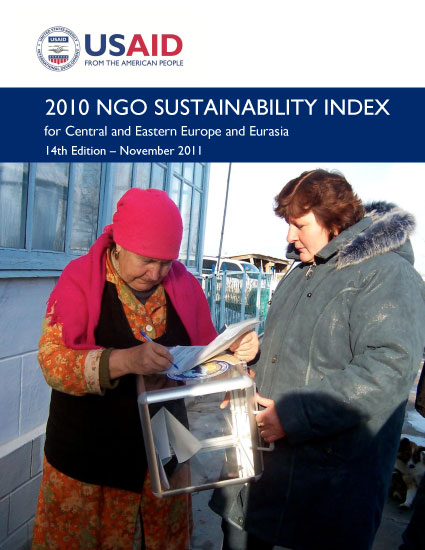- What We Do
- Agriculture and Food Security
- Democracy, Human Rights and Governance
- Democracy, Human Rights and Governance Strategy
- Supporting Free and Fair Elections
- Supporting Vibrant Civil Society & Independent Media
- Protecting Human Rights
- Promoting Accountability & Transparency
- Importance of Democracy, Human Rights, & Governance to Development
- Countering Trafficking in Persons
- Economic Growth and Trade
- Education
- Ending Extreme Poverty
- Environment and Global Climate Change
- Gender Equality and Women's Empowerment
- Global Health
- Water and Sanitation
- Working in Crises and Conflict
- U.S. Global Development Lab
INTRODUCTION
USAID is proud to present the fourteenth edition of the NGO Sustainability Index for Central and Eastern Europe and Eurasia, covering developments in 2010.
For the fourteenth year, the NGO Sustainability Index for Central and Eastern Europe and Eurasia reports on the strength and overall viability of NGO sectors in each country in the region, from the Baltic countries to Central Asia. The Index highlights both advances and setbacks in sectoral development, and allows for comparisons across countries and subregions over time. The Index is an important and unique tool for local NGOs, governments, donors, academics, and others to understand and measure the sustainability of the NGO sector. This year, USAID will publish the second edition of the NGO Sustainability Index for Sub-Saharan Africa, and in 2011 will expand the use of this tool to the Middle East North Africa region.
The NGO Sustainability Index analyzes and assigns scores to seven interrelated dimensions: legal environment, organizational capacity, financial viability, advocacy, service provision, infrastructure, and public image. The scores for the dimensions are averaged to produce an overall sustainability score. A panel of NGO practitioners and experts in each country assesses the sector’s performance in each of the seven dimensions. A Washington-based editorial committee of technical and regional experts reviews the panel’s findings. In some countries, expert panels are convened in several regions of the country in order to accurately reflect regional differences.
Based on their scores, countries fall within three basic stages of development in terms of NGO sustainability: sustainability enhanced, sustainability evolving, and sustainability impeded. More detail about the methodology used to calculate scores is provided in Sections 1 through 3 (pages 12-19). The 2010 Index includes at the outset of each report a statistical summary showing this year’s scores for each dimension, plus the overall score, as well as identification of the capital, population, and a summary of basic economic indicators. Reports include comparative information regarding prior years’ dimension scores, encapsulated in easy-to-read charts. The Index also features statistical appendices summarizing this year’s dimension scores; as well as, scores for 1997-2010.
A publication of this type would not be possible without the contributions of many. Specific acknowledgements of the NGO implementers who organized expert group discussions and drafted reports for the Index appear on the following page. USAID would further like to express our deepest gratitude to all of the local NGO experts, USAID partners, and international donors who participated in the expert group discussions in each country. Their knowledge, perceptions, ideas, observations, and contributions are the foundation upon which this Index is based.








Comment
Make a general inquiry or suggest an improvement.